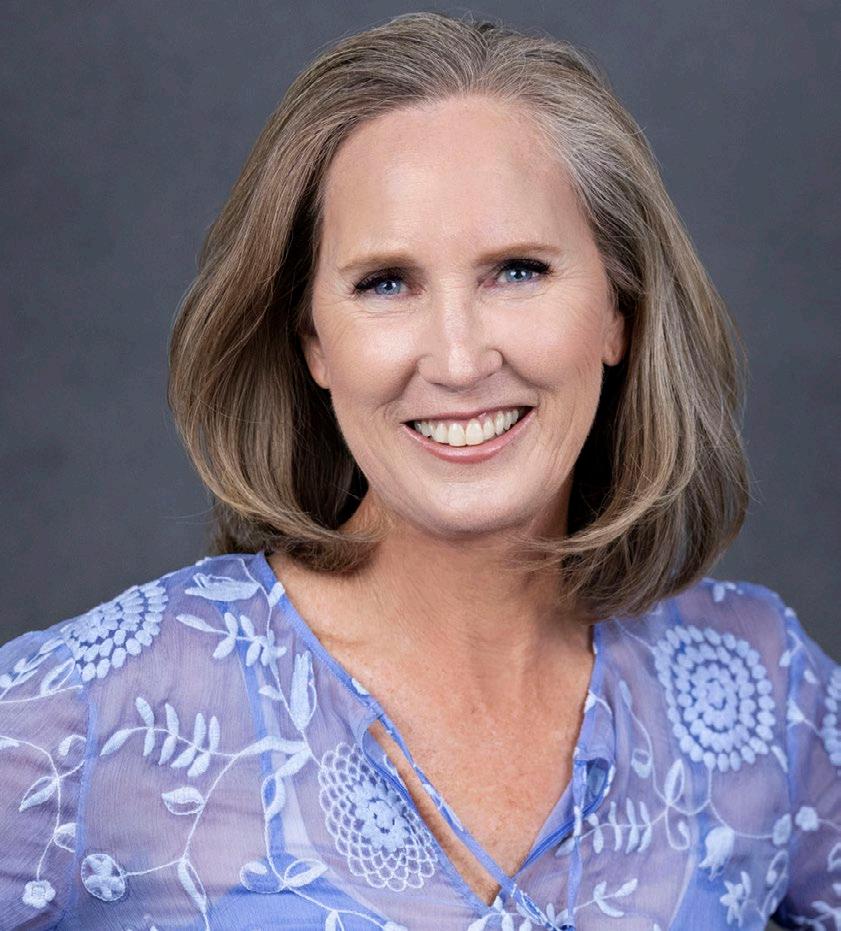Author

Juliet Clark is a six- time author, speaker and podcaster who has spent the last twenty years helping authors, coaches, speakers, and small businesses all over the world build expert audiences.

She started out as a mystery novelist and is best known or her books Gypsy, Granny Heist, and Dead by Dawn, and Pitchslapped. At age 46, she received a black belt in Tae Kwon Do and is an avid hiker and golfer.
Publisher’s Corner
April is here and everything in the world is turning green. If you are still hibernating, it’s time to come out of your cocoon and move into action!
What is your revenue- generating end game? Remember that your book is a nurture tool, so you need next step moneymakers. Parchelle Tashi shares her course platform and workshops to help you build more online credibility.
Author traffic school has launched! We are helping authors learn how to build a platform AND most importantly, learn how to drive traffic. A platform without traffic is a wasted platform.
Melanie Herschorn shares words of wisdom about book marketing and so much more this month.
Love and Gratitude, Juliet

Rubin

April is the kindest month. April gets you out of your head and out working in the garden.
~Marty
Do You Need Author Traffic School?

Building an author platform is a combination of tech, marketing, and learning to drive traffic to your platform. You must build the assets to attract and nurture and audience.
You may be asking, “Where do I start?” There are many keys to building a platform and most authors require help on the basics. When starting with the basics, it boils down to audience research and understanding why that audience buys.
The first exercises include evaluating where you are now, niching your audience, and knowing your strengths and weaknesses. Building a platform and executing will take time. Knowing where you are strong allows you to learn. It also teaches you where you need to delegate the tasks that do not directly generate revenue.
Once all of this is in place, it is time to plan. Your plan is a rollout for the year, quarter, and month. When building a platform, you need to break down the tasks into bite-sized tasks. Trying to build all eight pillars at once will cause more overwhelm and it’s likely that it will not be completed. This phase is also the time to check in with your brand alignment and whether your build is in service to your following. It’s a big no-no to build a salesy platform.
The next phase of this process is content. How will you build content?
What tech will it take to build a YouTube channel, podcast, blog, or whatever you choose to deliver value to your followers? This is a step that cannot be skipped because it is your trust-builder. For those who do not have ideas, you are writing a book and parts of that can be repurposed as content that you disseminate in advance.
Once you have consistent content, it is time to build your social media accounts. Do you have groups, business pages, and are you delivering posts to your audience and engaging with your followers? It is important to jump back into your accounts and answer anyone who posts. This is where we begin to build a relationship.
Social media is essential. However, we do not own our own social media accounts so it is imperative to create a lead magnet, or five, to attract people from social media into your email list. Your email list is a company asset and a tool that cannot disappear with an algorithm change. Your social media and email lists are the main tools used for your book launch. You must learn to drive traffic to your lead magnets through social media, speaking, and media to build your list.
All this work is building a marketing funnel. This funnel will not only be used for your book launch campaign, but also for driving traffic to your next steps after the book launch. Typically, you will not get direct return-on-investment (ROI) from your publishing package. Your book is a nurture tool. Your revenue will come from the next steps that you sell. That may be coaching, masterminds, or anything else that comprises your big-ticket sale. You will need a funnel for this as well.
Traffic drives need the tech to be built to support your offerings and learning how to attract clients into your funnel to begin the relationship process. This takes practice and knowledge of how to build a platform and transition fans from your platform to a personal relationship.
Big-ticket items especially require a relationship. No one clicks and purchases offerings without a relationship. Always remember in this process that a click is not a relationship. Only you can make the overtures to build personal relationships with potential clients.
Checkout our offerings at www. authortrafficschool.com.

3 Author
Juliet Clark is a six- time author, speaker and podcaster who has spent the last twenty years helping authors, coaches, speakers, and small businesses all over the world build expert audiences. She started out as a mystery novelist and is best known or her books Gypsy, Granny Heist, and Dead by Dawn, and Pitchslapped. At age 46, she received a black belt in Tae Kwon Do and is an avid hiker and golfer.
THE CURE FOR WRITER’S BLOCK EMPTINESS
One of the greatest challenges most writers and authors face is the phenomenon known as ‘writer’s block’. Even some of the greats such as Tolstoy and F Scott Fitzgerald went long periods of time with writer’s block Writer’s block are those moments when you sit in front of an empty screen or empty piece of paper, and nothing comes out. For another perspective, see the emptiness as a metaphor. See it as a signal to shift your energy.
Why? Because a block is a product of resistance. Resistance creates stress and eventually breakdown. Literally the energy is not flowing, like a dam blocks the flow of water. If you keep ruminating on being stuck with the stress of not meeting your writing goal, you will fall deeper into the block. It becomes a cyclical stress reaction.

Sometimes ideas come in waves, and we just need to rest in stillness to allow the waves to flow through our consciousness. To close your eyes and breathe and empty the mind and emotions to make room for the inspiration. Sometimes you need to move your body and empty yourself in nature. Taking a walk in a forest or walking along the shore listening to the waves. Inspiration comes when we surrender the overworked mind.
Make sure you bring your phone with you and have a transcription app such as Otter. This way, when the waves of inspiration hit you, you can record it. When you come back home, the already transcribed text can be copied and pasted onto your empty screen, ready to be reworked and refined. If this does not work, you can do what author Joan Didion does when she is blocked, put the manuscript in a freezer bag and stick it in the freezer.
AUTHOR BIO

Jared Rosen is the founder Of DreamSculpt. As an innovator in digital media publishing, he has published over 50 media enhanced e-books for many best-selling authors and filmmakers and has published dozens of books in print. Jared is the author of three books including the groundbreaking book The Flip. As a thought leader he has presented in venues ranging from TED X Malibu, to McKinsey and Company, Sydney, Australia. In 2000, Jared co-created the Children’s Emotional Literacy Project endorsed by Mayor Richard Riordan and Norman Lear.

Author 4
Media Booking
As an author, promoting your book is a crucial aspect of your publishing journey. One effective way to do this is by reaching out to media outlets and event producers to increase exposure and bring your book to a broader audience. To maximize your chances of success, here are some tips on using your book to pitch the media and event producers and get booked.
First and foremost, it is important to understand your target audience. Knowing who will likely be interested in your book and want to hear you speak about it will help you tailor your pitch to their needs and interests. Build a list of media outlets and journalists who cover topics related to your book, and look for outlets with a large following or reach. When writing your pitch, make it brief, concise, and to the point, starting with a hook that grabs the reader’s attention and highlights your experience and expertise.

Making personal connections can also be key to getting your pitch in front of the right person. Reach out to journalists or event producers you know or those you’ve met at conferences or events. Utilizing social media, such as Twitter and LinkedIn, can also be a powerful tool for authors looking to promote their books. Share news, updates,
and interesting tidbits about your book and reach out to journalists and event producers directly through these platforms.
Getting booked by the media or event producers may take time and effort, so be prepared to be persistent. Follow up with journalists and event producers after you’ve sent your pitch, and be patient as they review your materials. If they’re not interested, don’t take it personally.
Finally, if you do get booked, prepare for your interview or speaking engagement. Review your book and brush up on key topics and themes so you can engage with your audience and talk about your work in an informed and engaging way.
In conclusion, using your book as a tool to pitch to the media and event producers is a powerful way to increase exposure and promote your work. By understanding your target audience, crafting a compelling pitch, leveraging personal connections and social media, and being persistent, you can increase your chances of getting booked and helping your book reach its full potential. If you want support with getting booked or contacting the media reach out at www.ShannonProcise.com/ superbrand for free consultation.
Shannon Procise has successfully attained over $3.2M in FREE publicity and is notorious for being the owner of the “Million Dollar Rolodex” and teaching others how to do the same. She has trained and coached thousands of individuals in marketing, event production, business development, and personal growth.
Shannon is the creator of a magnetic community - the Business Acceleration Network, where she guides businesses to build a successful enterprise while having fun and making lots of money.

5 Author
Book Developer VS Developmental Editor
Simply put, a book developers and developmental editors are both people who help authors plan and execute the writing of their books. They both can save you time, money, and oh so much aggravation.

Why is it a good idea to investigate working with a book developer and a developmental editor? Most authors find themselves in the position of knowing they have a book inside them, but they spin in their heads. Have you felt that? Like there’s just so much to say that you can’t even find a place to start? You are not alone. A developer helps you focus so that you can get those ideas out of your head and on to the page in a cohesive way that reaches your readers.
As for choosing whether to work with a book developer or a developmental editor, what it comes down to is this: do you want help with the big idea? Do you prefer a more hands-off approach? Then a book developer may be a better choice to help you form your idea into a book. One caveat: be aware that you will need editing after you are done in development.

Author 6
However, if you want more guidance, more hands-on, a professional set of eyes reading your manuscript and giving direct feedback, then go with a developmental editor. This choice moves you from idea to finished product faster and more efficiently.

Once you have decided which way to go, you will want to interview potential developers to see if you’re a good match. Here are some tips:
1. Ask questions. First and foremost, you want someone on your side with whom you get along and will support you.
2. Get solid answers. A good developer is more than “pie in the sky.” You want to get honest answers to your questions. If the person just says what you want to hear, you might want to look around some more.
3. Make sure they give you a realistic timeline. While there is no hard and fast rule about how long it takes to write a book, a good developer should at least be able to give some guidelines.
4. They offer concrete help, not just big promises. The person you are interviewing may be a great salesman, but can they deliver?
5. It helps if the developer has a basic understanding of your topic, but it isn’t essential. Some of the best books I have worked on were on topics that I didn’t know, but the rapport I shared with the author made it possible to easily communicate when I had questions.
6. Look for a developer who works with highly qualified (and honest) publishers. Chances are that kind of long-term relationship shows a person of integrity and professionalism.
So that’s it in a nutshell. Of course, there’s more to it than that, and we’ll explore more in the next issue. Meanwhile, if you want more information, feel free to jump on my calendar for a no-pressure conversation: https://calendly.com/ livingmycreativity/chatwithkristy Ciao for now.
Kristy Boyd Johnson is an awardwinning children’s author, and has ghostwritten over 30 books for entrepreneurs over the years. She is a sought-after developmental editor and transformational book coach. She recently launched Starseed Journey Retreats because she can’t imagine anything better than being a beautiful location with beautiful people who want to reconnect with their deepest selves through writing.

7 Author
ANCHOR STORY: The one personal story that makes you unique and usually ties specifically with why you became an expert in the field that you are in. This becomes part of your Deck of Cards (which I’ll share more of in a follow up article).
Your anchor story is an important part of your pitch to a producer, as it signals what makes you unique as an individual. It’s your personal hook that separates you from the pack, so to speak. Maybe you had a near death experience that set you on the path to becoming a healer and writing a book. An anchor story could also be about the allergies you had to overcome that led you to creating an environmentally friendly cosmetics product line. Or how you spiced up your sex life in your marriage AND found love after fifty, and now you want to help other couples do the same. One of the reasons an anchor story is so vital in helping you get booked is that it’s what makes you memorable to a producer. It’s the story that defines the why. The why you do what you do. The most frequently booked experts all have one.
During your actual on-air segment, your anchor story can serve any number of functions. It could impact the way the host introduces you, and the lead of your story, and/or the central topic you’re there to talk about. It could define the anatomy of the entire segment. It may also be something that won’t lead the segment but will emerge out of your storytelling.
As important as an anchor story is in the pitch to the producer, be aware that at times it might not be relevant to the topic at hand and may never be brought up at all. For example, if a producer is looking to book an attorney to speak on a case as a legal expert, she’ll need to know what makes the attorney stand out as an on-air personality, or what makes him or his expertise unique. Chances are his anchor story isn’t likely to be an important element of the eventual segment. In this example, the attorney is being interviewed as a legal expert brought in to speak about a celebrity trial, a new bill, or a new law going into effect. It’s pretty much set in stone that he’s not going to give the host anything personal. This doesn’t necessarily mean he’s going to be boring or dry. It just means that his responsibilities as a guest will most likely lean toward providing simple answers to the host’s questions.
Jacquie is the founder and CEO of the 15-year-old cuttingedge, media and content development, promotions and booking platform, TVGuestpert that offers full-service promotion, marketing, business strategy and media services for her clients, partners and collaborators, TVGuestpert Publishing - a NY Times Best Selling publishing house, and The Guestpert Academy - an online program offering visibility, media training and TVGuestpert OnCamera Training. She is also a two-time Emmy nominated TV Producer, three-time author and the host of Front & Center with Jacquie Jordan, a broadcast podcast.
 Excerpt from The Ultimate On-Camera Guidebook: Hosts*Experts*Influencers by Jacquie Jordan (@TVGuestpert) & Shannon O’Dowd (@theshannonodowd)
Excerpt from The Ultimate On-Camera Guidebook: Hosts*Experts*Influencers by Jacquie Jordan (@TVGuestpert) & Shannon O’Dowd (@theshannonodowd)
Author 8
CHOOSINg BISAC AND AMAzON CATEgORIES
When books are published, they are classified into genres and subcategories so bookstores and readers can easily find them. Understanding how these codes and categories impact your searchability could be the difference between readers finding your book and not finding your book.
BISAC codes are used by the publishing industry to properly categorize your book. When a publisher enters your book into the system, it is done by relevant content. The BISAC system has about four thousand codes, which limits searchability. It is important to be specific about the BISAC codes the publisher uses.
Many times, a publisher will place a book in a general BISAC code to get the job done. The problem with indexing a book into a general code is that it is a catchall with millions of books. That means your book gets lost in the numbers. When using a BISAC code, it is important to make sure that your publisher uses codes that describe the book in detail.
We recently republished a book with additions. The original publisher placed the author’s book in a general category. When we looked at his ranking, he was ranked as 7,014. That means, in order to find his book, a reader would be shown 7,000 plus books before this author’s book. While the book was spiritual in nature, it was more of an African religion book. Since the BISAC code can be changed at any time, when we published the book, it went into a BISAC code related to African Spirituality and the book was on page two of the search with very few books in front of it.
The great thing about BISAC codes is that a publisher can initially use three when the book is uploaded and up to ten when a book is entered into the e-book system. That gives the publisher thirteen opportunities to classify the book.
The category system within Amazon is so large that specificity is important to locate any product. Plus, you have to remember that Amazon is really a large search engine.

Amazon has a different system that is more specific than the BISAC system. Amazon offers about sixteen thousand category choices, compared to about four thousand in the BISAC system. Most of the time, Amazon users will use keywords to locate products. The Amazon categories are flexible and new categories can be requested. Because categories can be changed at any time, the Amazon system also offers an opportunity to experiment and test categories as well.
The downside of this system is that some publishers will manipulate categories at the time of launch to propel an author to a bestseller list. This is not a good long-term strategy because you will want to sell books beyond the launch, but it is unlikely that readers will find your book after the launch if it is not correctly categorized.

Even though these systems are separate, categorizing is important to maximizing your book’s visibility.
 Juliet Clark is a six- time author, speaker and podcaster who has spent the last twenty years helping authors, coaches, speakers, and small businesses all over the world build expert audiences.
She started out as a mystery novelist and is best known or her books Gypsy, Granny Heist, and Dead by Dawn, and Pitchslapped. At age 46, she received a black belt in Tae Kwon Do and is an avid hiker and golfer.
Juliet Clark is a six- time author, speaker and podcaster who has spent the last twenty years helping authors, coaches, speakers, and small businesses all over the world build expert audiences.
She started out as a mystery novelist and is best known or her books Gypsy, Granny Heist, and Dead by Dawn, and Pitchslapped. At age 46, she received a black belt in Tae Kwon Do and is an avid hiker and golfer.
9 Author
Stepping into VIP Book Marketing

What’s in a name?
Well, as an author you know…everything!
If the title of your book, course, program, or speech does not instantly resonate with your ideal audience, then they likely will not click the “buy now” button.
Author 10
Confusion causes people to keep scrolling. It is clarity that gets them to stick around as they wonder subconsciously, what’s in it for me? And your business name requires that same level of clarity.
I’m thrilled to announce that my company has a new name: VIP Book Marketing.
Our mission remains the same, of course. We provide nonfiction and children’s book authors with a VIP experience as we partner together to create a book marketing strategy for Visibility, Impact, and Profit.
But this is not my first entrepreneurial venture, and I definitely learned the hard way that clinging to a name that doesn’t suit your company (or book, for that matter) will not serve you in the long run.
Before I became a book marketing strategist, I launched a line of breastfeeding clothing for new moms. Back in those days, I believed that the name of the company was perfect – a play on words that made many people laugh – and I was adamant that the name should stay despite any naysayers.
Even though I sold my designs on Nordstrom.com, Amazon, and at boutiques across the country, over 7 years, I lost out on a lot of business simply because of the name. Shop owners who were turned off or felt that their customers might not get the cheekiness of the company name did not

hesitate to tell me that they would not sell these products in their stores.
Looking back, I realize that a name change would have done me good. So when a trusted friend and business mentor recently told me that my current company name no longer applied to my business, I did not hesitate for a moment. It’s not always easy to get a DBA or change your logo, web domain, or email address, but I did it all.
To me, the need for clarity and to be found by future author clients far exceeds any desire to keep things status quo just because it is easier to do nothing. Change is hard but it is necessary sometimes. And this was one of those times.

So while I will continue to help authors get their books out to the world and make an impact with a customized marketing strategy, I will now be doing it from a company with a name that fits the services I provide.
I even have a shiny new website to go along with the name change. It features fun new photos from a recent branding photo shoot and lots of freebies and tips for authors who are ready to market their books and want some guidance. Come check it out at vipbookmarketing.com. While you’re there, go ahead and grab the Ultimate Book Marketing Checklist too!
Melanie Herschorn wants to make your book and brand sparkle online. As a content marketing strategist for coaches, consultants, and speakers worldwide, she’s on a mission to support and empower her clients to create clear messaging and content that shines a light on their individual experience, skillset, and books. With her unique combination of entrepreneurship, award-winning journalism and PR experience, Melanie guides her clients to attract and nurture leads and position themselves as industry experts. She also loves to provide book marketing tips on her show, AUTHORity Marketing LIVE!
Melanie Bio
11 Author
Change is hard but it is necessary sometimes. And this was one of those times.
Building Your Author Brand with Engaging VidEo ContEnt
The 5 essenTial Videos for Your WebsiTe

As an author, having a strong online presence is crucial to establishing your expertise, building your brand, and attracting your ideal customers and clients. One of the best ways to achieve this is by creating engaging and informative videos highlighting who you are, what sets you apart, and what services or products you offer.
The best video content does all of that AND helps you build trust and affinity with your audience. After watching your videos, your audience should feel like they know you. It is that feeling of trust and connection that will
turn your audience into fans, customers, and clients.
Here are the five most critical videos that you can have on your website, pinned to your social channels, or anywhere else where you have an online presence:
1. The Hero Video: This video should be an introduction to who you are as an author, what your unique selling point is, and what makes you stand out from others in your field. This is your chance to make a lasting impression and help your audience understand why you are the best fit for their needs. This video
belongs on the homepage of your website and should be pinned on your LinkedIn, YouTube, or other important social channels.
2. The Elevator Pitch Video: This super short and tothe-point video lets your audience know who you are, what you have to offer, and why it is valuable. It should grab their attention and encourage them to explore your work further. If you’re on LinkedIn, this should be your profile video.
3. The Backstory Video: This video provides insight into who you are, what inspired
Author 12
you to become a writer, what your journey has been like, and what motivates you. It helps your audience connect with you on a personal level and understand what makes you tick.
4. The Disruptor Video: This video showcases your innovative ideas, creative thinking, and unique approach to the subject matter in which you are an expert. It provides an opportunity to showcase what differentiates you from others in your industry and why your audience should be interested in your work.
5. The Problem Solved Video: This video should focus on how your work and services help solve a problem or address a need that your audience has. It’s not a specific product or service video, but rather a holistic overview of how you help your audience members and what kind of benefits they can expect from reading your work or working with you directly.
These five videos are essential for authors looking to build their brand, showcase their expertise and attract their ideal customers and clients.
Ok, great, you may be thinking, but how do I go about making them!?!
The good news is you have all of the content for these videos in your brain already. All you need to do is get it organized.
Stay tuned for some of our future articles about video production and go to clockwiseproductions. com and download our Free Guide to the 5 Videos
I would legitimately love to help you and answer your video marketing questions: Email me (Nina) at nina@ clockwiseproductions.com or DM me on LinkedIn: https://www.linkedin.com/in/ nina-froriep/
Hi! We’re Robin Friend Stift and Nina Froriep of Clock Wise Productions, a New York City based video marketing company.

We teach authors, speakers, business coaches, and consultants to create easy and impactful video content for LinkedIn so they can enlighten, change, and disrupt the status quo of their industry. And we’re super excited that Juliet asked us to be your video marketing experts for 2023.
Over the next 12 months, we plan on giving you a quick overview of all aspects of video marketing to get your creative juices flowing and to get your most burning video marketing questions answered. AND, to that end we would love to hear from you! Send us a DM on LinkedIn or email Nina: nina@clockwiseproductions.com or DM her on LinkedIn: https://www.linkedin.com/ in/nina-froriep/
Nina Froriep helps mission-driven entrepreneurs to grow their business with consistent and easyto-implement video marketing through one-onone coaching or peer-learning. I’m a filmmaker, producer and director with 30 years experience and a small business owner of 23 years. I’ve seen it all from the early days on independent features, to big national TV commercials, corporate megashows and many documentary films.
13 Author
These five videos are essenTial for auThors looking To build Their brand, showcase Their experTise and aTTracT Their ideal cusTomers and clienTs.
MONETIzINg YOUR CONTENT
you provide a platform that allows the learner to consume information in a way that inspires action and add mentorship to the equation that will supercharge the learning timeframe.

Most of the time, the mentorship will open the eyes of the course taker. We know this from our own experiences with our I Love Content Creation course. Our students come to us with no idea where to start or sometimes even that they already have content to share. Once we break it all down into bite- sized chunks, the students get it. That is what Author’s Leverage is good at. Most writers can create an outline for a book and begin writing. Having someone that understands course curriculum and how to teach in ways that reach a three of the learning modalities, makes your course ideal for the way that any student learns.
Experts who write books know that monetizing their content is a must! Most honest publishers will tell you that you will not get direct Return in Investment (ROI) from your book. This means that the money you put into book development and publishing will not generate a return from the book. Most authors will use their book as a nurture tool and bring readers into their programs, products, and services to get the return they are looking for.
That is where Parchelle Tashi and Author’s Leverage comes to the rescue. Your book is one big piece of content. You are sharing the unique way that you approach the industry you work in as a professional. Your book is a way for new audiences to find you, learn more about you, and discover your unique value proposition within the industry.
As a former math teacher, Parchelle knows how to take your book’s content and turn it into the courses that will generate the revenue experts are seeking. Whether the course is a DIY, group, or one- on- one experience, you need an academy for your consumers to get information and learn about the concepts in your book. Many readers will purchase a book and never execute on the trainings in the book. They either get overwhelmed or just decide they do not have time. By creating courses,
Parchelle Tashi is an award winning creative entrepreneur, popular podcast host, and creator of The Author’s Leverage. A former high school math teacher turned tech-preneur, she’s an education design architect and video producer with a Masters in Curriculum & Instruction from Virginia Tech.

In addition to the guidance Author’s Leverage provides, they also provide weekend workshops to get the entire course created in two days. For busy entrepreneurs who want to get out of the business of one-on-one coaching and into group coaching or provide work-at-your-own pace courses, a weekend with Parchelle can accelerate this process and give you additional income streams.
Parchelle also creates amazing videography. If you want a course that is more professional and glossier, her team can polish your course and make it ready for the corporate world as well.
Author 14
How To Make This Your Best Year of Content Marketing
Iwork with a lot of authors who hit the ground running in January and by February have lost steam. Content Marketing can be overwhelming, especially if you’re tackling it by yourself. The best way to counter this overwhelm is putting a strategy in place.
This is non-negotiable. Seth Godin once said authors should begin building their author platform three years before they launch their book. The most successful authors know that good, consistent content, that serves your purpose, is key to a strong author platform and ultimately book sales. So let’s talk strategy.
A successful content marketing strategy targets and draws in your audience and keeps them engaged, even after they’ve made a purchase from you.
Strategizing In A Few Easy Steps
• Who? Understanding your audience is the most important factor in your strategy - and even with your book. If you don’t know who your reader is, how do you know what they need or want to hear from you? Many books miss their mark for this reason so do not slack on this step. A detailed avatar of your reader is necessary.
• What? You’re most likely solving a problem for your reader. If so, what is the problem? Now simplify it. The better you can break this piece down and get really specific, the more of a niche solution you can provide. Use your content to share this solution over and over, until the reader feels a sense of urgency, they need your book. If you can, break it into topics that are relevant keywords to your book and author platform. Then, once you get to the scheduling part, you can easily drop topics into their proper days and creating content around a predetermined topic is so much easier than starting each day or piece from scratch.

• Why? What makes you unique and how can you integrate that angle into the content you want to deliver? If you want readers to buy your book, you have to earn their trust and prove that you are the one they should be listening to.
• Where? Now it’s time to outline where your audience is already hanging out. Once you have this information, tailor your content to those specific platforms. This is much easier than showing up somewhere new and trying to bring your readers to you.

• How? Now it’s time for the most daunting task. How will you create content and how will it get posted? There are plenty of schedulers like Hootsuite, that allows you to create content in batches and ahead of time. Before you commit to something like this, sit down with a calendar, pick your topics or posts for each day, put them on paper, and then move into your planning. Do not skip this step. On the days you lose steam, the content won’t happen, and then you’re back to square one.
You’ve likely completed this practice or something similar for your book but it never hurts to revisit and tighten the bolts even more. Focus on these simple steps and dig deep for the answers. This foundation will help you create content that has a purpose and speaks directly to the audience you are trying to capture.
Don’t rule out delegating. My last piece of advice is this: there are professionals who do this every day. If you are not able to dedicate time to creating meaningful and effective content to market yourself as an author, let someone else do it for you. These services often cost less than you would expect.
International Content Expert Sara Burke is the Founder of HLCC, a content creation firm dedicated to boosting small businesses around the world. Sara has authored three books, and ghostwritten over 100 books, ebooks and workbooks. Sara recently launched The New American Dream, a podcast dedicated to helping business owners understand how our changing business ecosystem can support their success.
IF yOU’RE AlREADy FAllIng BEHInD On SHARIng, USE THIS STRATEgy TO gET BAck On TRAck.
15 Author
Why Authors should hAve A Blog

Once you’ve created an outstanding book, you might as well make sure you get the most out of that content by putting your voice and angle in as many places as possible. A very effective way to capitalize on book content, release sneak peeks, and establish yourself as an authority - aside from social media - is by creating an (oldfashioned) blog.
The most successful blogs are consistent (read: weekly or daily) and I want to lead with that, because just like podcasting or even writing, the less consistent you are, the fewer results you will see and the less success you will have. Blogs, when done right, can generate a tremendous amount of traffic based on SEO and keywords alone, something I know you’ve heard Juliet talk about often.
I encourage my podcasting guests to create blogs for each podcast episode they create and we even offer this as a service and are astounded by the growth results.
Why? Because blog post text that is rich in keywords is the currency of Google. Especially if you are writing about heavily searched topics, you will begin to see traffic you wouldn’t otherwise see on your author website.
Even better than that, any blog post carries a search relevancy of more than a year. Blog posts are evergreen content. They have a life expectancy that far outlasts any other type of content that is searchable through Google.
Your blog will connect you to your readers and drive traffic but it will
also establish major credibility, highlight your writing style and show readers the value you bring to the table.
How to Write A great Blog Post
1. Brainstorm Topics. Build a list of what you’ll blog about, along with a supporting thought of how it ties back to your book. This way, when you sit down to write, you already have a strong starting point.
2. Make the Headline Specific. Clever headlines are fine but the main goal is to let potential readers know exactly what they’re about to read and to make sure the main idea is conveyed for searchability.
3. Organize your content. A good blog post will flow well and will have subheadings to
Author 16
keep readers drawn into the next idea you’re about to share. Make sure your blog post flows in the order the reader would expect it to. Keep it simple and specific to the overall message you are trying to convey.
4. Build in Important keywords. Just like any other content marketing or SEO you do online, keywords will help potential readers find you and should be littered throughout your blog post - where it makes sense. Blogging is another piece of the content marketing puzzle and thinking about it this way will help you get the most out of each post.
5. End with a Powerful cTA. Whether you’re driving traffic through an internal link, trying to get blog post readers to buy your book or to follow you on social media, end your blog post with some sort of Call To Action that feeds the ecosystem you are building. It is also a great idea to use some of these CTA’s as a way to inspire motivation and link that message back to a CTA in your book. For example, if your book is about meditation, use your CTA to encourage your reader to put a 10-minute block on their calendar and meditate at least two days that week.
A Few Ideas to get your Blog Started:

• Use excerpts from your book. Teasers and excerpts are a great way to give readers an idea of what they will find in your book, minimizing the risk of them buying it and not liking it. If they’ve already seen some of the content, it feels less risky for them to make that purchase. Word of caution: Do not publish full chapters. Giving away too much will hurt your book sales, if the reader can get everything from your blog.
• Share characters. If your book is fiction, write about characters in your book. Let the reader get to know the characters and connect with them.
• Share reviews. If your book is already published, share reader reviews and do a deep dive into the review or give your opinion of the review. Keep it positive and authentic. Your readers will feel like they’re really seeing behind-the-scenes.
• Share your writing process. Speaking of behind-thescenes, readers love to know how authors do what they do. Share your process for writing content, how you came up with the idea for your book or how you developed characters.
• Write about your life. Readers love to know that you’re a real person. Share daily experiences, special moments, travel - whatever you’re comfortable sharing about your personal life. Let your readers get to know you and connect with you in your everyday experiences.
Ultimately, you will find that it’s easier to build an audience for your book if you include a blog in your growth plans. Consistent blogging that reinforces your writing, while putting searchable content on Google, is a great way to get in front of more people and drive more traffic to your book.
Tracy Hazzard is a seasoned media expert with over 2600 interviews from articles in Authority Magazine, BuzzFeed, and her Inc. Magazine column; and from her multiple topranked videocasts and podcasts like The Binge Factor and Feed Your Brand – one of CIO’s Top 26 Entrepreneur Podcasts. Tracy brings diverse views from what works and what doesn’t work in marketing, branding and media from thought leaders and industry icons redefining success around the globe. Tracy’s unique gift to the podcasting, marketing, and branding world is being able to identify that unique binge-able factor – the thing that makes people come back again and again, listen actively, share as raving fans, and buy everything you have to sell.

17 Author


















 Excerpt from The Ultimate On-Camera Guidebook: Hosts*Experts*Influencers by Jacquie Jordan (@TVGuestpert) & Shannon O’Dowd (@theshannonodowd)
Excerpt from The Ultimate On-Camera Guidebook: Hosts*Experts*Influencers by Jacquie Jordan (@TVGuestpert) & Shannon O’Dowd (@theshannonodowd)


 Juliet Clark is a six- time author, speaker and podcaster who has spent the last twenty years helping authors, coaches, speakers, and small businesses all over the world build expert audiences.
She started out as a mystery novelist and is best known or her books Gypsy, Granny Heist, and Dead by Dawn, and Pitchslapped. At age 46, she received a black belt in Tae Kwon Do and is an avid hiker and golfer.
Juliet Clark is a six- time author, speaker and podcaster who has spent the last twenty years helping authors, coaches, speakers, and small businesses all over the world build expert audiences.
She started out as a mystery novelist and is best known or her books Gypsy, Granny Heist, and Dead by Dawn, and Pitchslapped. At age 46, she received a black belt in Tae Kwon Do and is an avid hiker and golfer.














